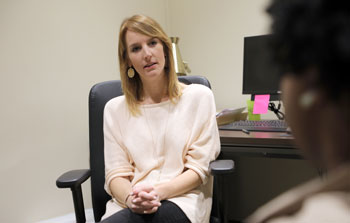An Advocate for Students Who’ve Experienced Sexual Assault
In a world that can feel unsafe to a sexual assault victim, Liz Noble provides a safe place. She is Baylor's new Advocate for Students. When she watched Baylor in the national media recently, she knew the campus was a place where she could put her heart's passion to work.

"I felt very aware that the problem that was being put in the media at Baylor is a problem across all college campuses," said Noble, who wanted to help students in need.
Noble started in her new role this November. She is a licensed counselor, part of Baylor's Counseling Center and a first point of contact for student's who've experienced interpersonal violence, which is trauma as a result of abuse, including sexual abuse.
Prior to the creation of Noble's role, therapists had to take time away from therapy to advocate for their clients. Noble is one of the completely confidential resources on campus where a student can get help managing details that have the potential to end their academic career. Employees of the Counseling Center, the Health Center and Chaplain Burt Burleson are the only Baylor employees not required to report incidents of sexual violence to Title IX.
"Students who have had an unwanted sexual experience often feel confused, overwhelmed and afraid to talk to anyone about their experience due to fears of being judged, misunderstood or blamed," said Cheryl Wooten, Assistant Director of Trauma Recovery at Baylor.
During the 2016-2017 academic year, the Counseling Center experienced a 52 percent increase in the number of students seeking services. Wooten alone worked with over 130 students struggling with a trauma-related disorder, with the large majority of cases involving students facing post-traumatic stress disorder.
In her few short months at Baylor, Noble has networked with key partners across the university, including student life, sorority advisors, the police department and the Title IX Office to share that she is a resource.
Often students might not reach out for help until several months after the abuse has occurred because they want to pretend it didn't happen and try to move on. "It's really overwhelming for them at times to figure out how to manage all of it on top of trying to process through what's happened to them," said Noble.
Simple daily tasks that most people take for granted may become difficult. Noble's role could encompass helping a student locate a new place to live because they no longer feel safe. She might talk with the financial aid office to determine what happens if a student's grades drop and how that affects their standing. She could meet with a professor to share that a student is having a difficult time focusing or attending class. She can also connect students with a counselor. Then there's the student's decision of whether to report the incident and navigate the criminal or legal process.
Baylor staff has been receptive and eager to help students in need, said Noble. "I want [the campus] to know there are people that are willing to do that, to go through the pain and the brokenness and all of the hurt that exists. They don't have to do it alone."
Liz Noble's office is located in the Dutton Counseling Center. She can be reached during office hours at 710-4983 with no appointment necessary.